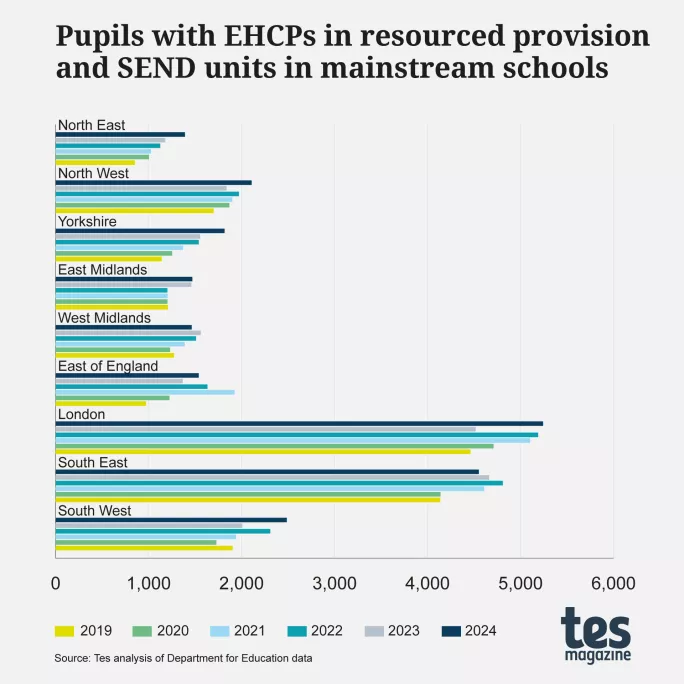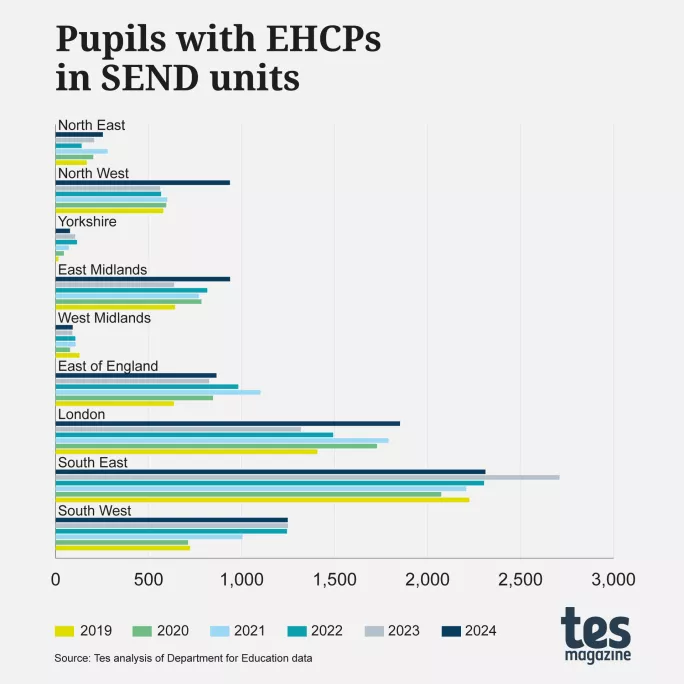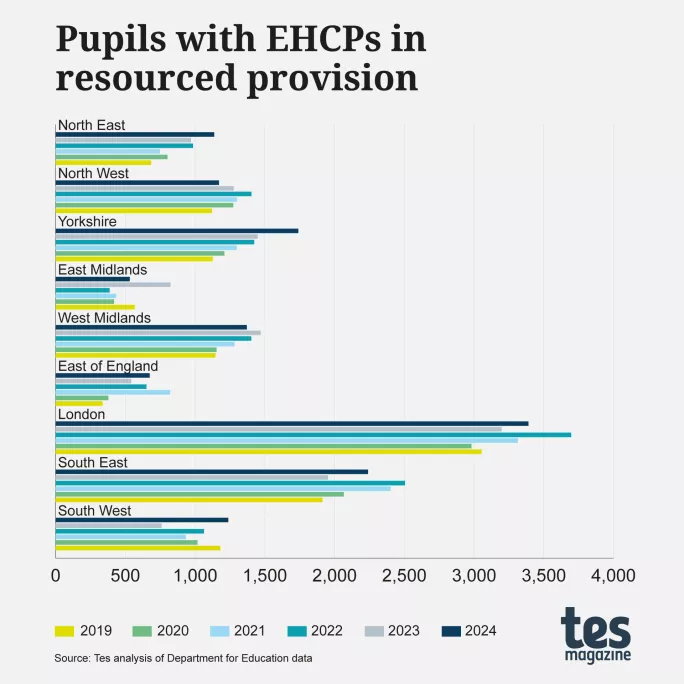SEND provision in mainstream ‘needs to be investigated’

The government is being urged to investigate how mainstream schools are using both formal and informal additional provision to support pupils with special educational needs and disabilities (SEND) amid concerns about a lack of oversight and guidance.
A Tes analysis reveals that the number of students with education, health and care plans (EHCPs) receiving formal support in a SEND unit or specialist resource provision (SRP) in a mainstream school has jumped by 25 per cent since before the pandemic.
And a survey of teachers suggests that informal provision for students with SEND - provision that is in mainstream schools but outside the classroom - is also being used widely.
One multi-academy trust leader has warned that the use of additional support outside of the classroom is at risk of becoming the “new Wild West” of the education system.
SEND support in mainstream schools
The Labour government has shone a spotlight on inclusion in mainstream schools. Education secretary Bridget Phillipson told the party’s conference last month that the future of the school system will “have to involve mainstream settings being inclusive” and that schools will need to support “a much wider range of often more complex needs than they might have experienced in the past”.
Anne Longfield, executive chair of the Centre for Young Lives think tank, said it was clear from discussions at the Labour Party Conference that “ministers want the vast majority of young people with SEND to be educated in mainstream school”. She said the role of SEND units and SRP could therefore become more important, requiring more focus from government.
Places in SRP and SEND units in mainstream schools are commissioned by local authorities. The Department for Education says these units receive £6,000 or £10,000 per pupil and “usually top-up funding for any additional costs of support required by individual pupils”.
These places are usually for pupils with an EHCP but can be taken by children who don’t have a plan but need SEND support.
SRP is officially defined as specialist facilities on a mainstream site for a small number of pupils who are otherwise in regular classrooms for most of their timetable. Students in SEND units are based there for at least half of their time in school.
Margaret Mulholland, SEND and inclusion specialist at the Association of School and College Leaders (ASCL), told Tes that, while the use of resourced provision “can certainly help” schools to be more inclusive, “there is also a risk of seeing it as a panacea to the complexity of needs in our schools”.
She said schools need support to navigate challenges with funding, space and curriculum when designing separate provision.
”The reality is that far more work is needed to address the SEND emergency,” Ms Mulholland added.
The government should investigate the use of additional provision by mainstream schools to better support it, she said.
- SEND support: Half of pupils in special schools “could have needs met in mainstream”
- Thought experiment: What if there were no special schools?
- SEND crisis: System-wide failings revealed
Amelie Thompson, assistant director of learning for SEND at Greenshaw Learning Trust, which has 35 schools in the South of England, said she agreed that formal provision of this nature needs government attention.
The system would benefit from more guidance to support leaders to make decisions about how to run provision in their schools, she added.
“A first step would be to better understand how resource provisions are being used within the system, where there are best practice examples of this and what the core components of these provisions are,” Ms Thompson told Tes.
Sector leaders and experts have voiced their concerns as Tes analysis of DfE data shows there has been a 25 per cent rise in the number of students with EHCPs placed in SRP and SEND units over the past six years, with numbers climbing across all nine English regions.

The North East has seen the largest increase, with the number of pupils with EHCPs placed in SRP or SEND units rising by almost two-thirds (63 per cent) between 2019 and 2024. There were also big rises in both Yorkshire and the Humber (a 59 per cent jump) and the East of England (a 58 per cent increase).


A freedom of information request to local authorities reveals that of the 62 councils that provided area-wide figures, 83 per cent were commissioning more SRP and SEND unit places in mainstream schools in 2023-24 than they were in 2021-22.
And Tes analysis of the most recent DfE regional advisory board minutes for May and for the periods before and after the election shows that the DfE’s regional directors have been approving the creation or expansion of SRPs and SEND units as “significant changes” to academy trust’s operations across the country.
Informal SEND provision in mainstream schools is also widespread, according to a Teacher Tapp survey commissioned by ASCL. Most teachers polled said their school had some sort of additional provision for small groups of pupils, but only a fraction said it was officially badged as resourced provision.
Respondents said the most common reasons for creating this additional provision were to accommodate pupils with social, emotional and mental health (SEMH) needs, students with moderate learning difficulties, autistic pupils and those with language and communication needs.
Fear of a ‘Wild West’
Dr Julie Greer, a former headteacher who has developed SRP and helped ASCL with its research, said the findings highlight a growing demand to meet SEND support requirements in mainstream schools.
She said that regulated SRP, officially funded by a local authority to meet the specific needs of pupils with EHCPs, can enable children to be fully integrated within mainstream classes.
But she added that it was concerning that much informal provision - either in rooms or bases - being developed in schools as inclusive provision could be “inadvertently excluding pupils from improving educational and social outcomes”.
Ms Mulholland said that having a mix of formal and informal approaches was a sign that the school system was innovating to meet challenges, but she added that flexible funding models were needed to support them.
Trust leaders have echoed the need for more guidance and support in this area.
Seamus Murphy, CEO of Turner Schools, which runs eight schools in Kent, said there “is a lack of oversight for how resourced provision is being used”.
“Local authorities are stretched and their capacity to oversee this is limited...there is a danger, I think, that this could become the new Wild West,” he added.
Jonny Uttley, chief executive of The Education Alliance, which runs 11 schools in the East Riding of Yorkshire, also voiced concern over a lack of strategic oversight of how resourced provision places are commissioned.
“It is not clear that councils, or anybody else for that matter, knows which schools are best placed to deliver this, who has the capacity and what best practice looks like”, he said, adding that he backed calls for a DfE investigation into additional provision to provide more clarity and oversight.
Mr Murphy said he is concerned about the use of informal provision in primary schools because it can mean secondary transition is more difficult for pupils who spend too much time outside of formal classrooms.
And Dr Greer told Tes that the nurturing support provided by primary schools outside of routine lessons can be difficult for secondaries to replicate.
Ofsted focus on inclusion
The way that schools are held to account on inclusion is set to change after Ofsted signalled that it is to develop a new criterion for inclusion as part of a new inspection process, coming into force from September next year.
The watchdog told Tes that it will consult on the new measure, which will aim to” increase our scrutiny and focus on how providers are meeting the needs of children and young people with vulnerabilities, such as SEND”.
The DfE has been approached for comment.




